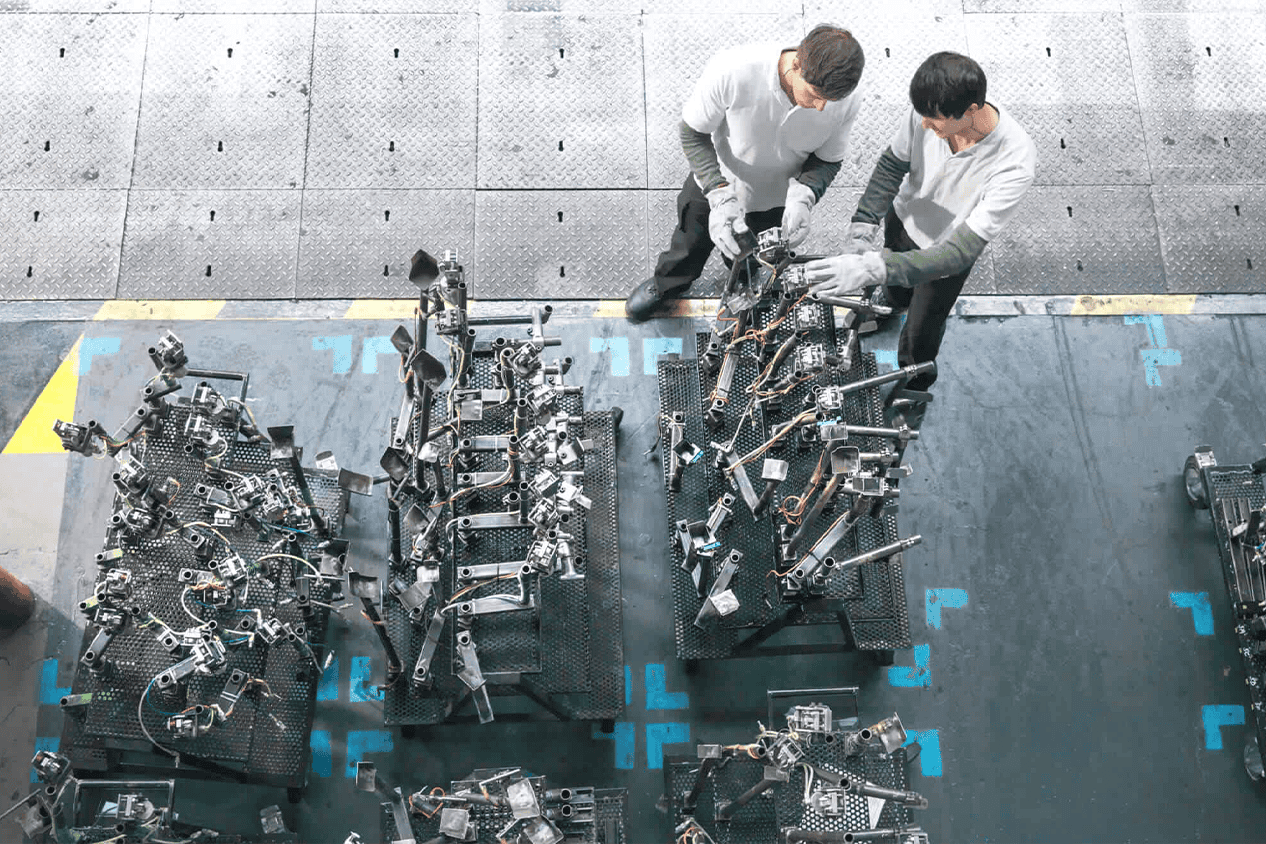Navigating Outsourced Manufacturing: Visibility, Quality, & Sustainability
Manufacturing Collaboration
Outsourced manufacturing was originally adopted as a low-cost strategy for brands. Since then, the practice has brought on new obstacles that have made it increasingly more difficult to achieve a sustainable and high-quality production operation. Today, managing contract manufacturers, quality, and risk are just a few of the obstacles organizations must navigate to remain agile and resilient. E2open helps brand owners gain control of product quality and risk through holistic visibility across both internal and external production. As the strategy for successful and profitable outsourced manufacturing continues to evolve, so must the capabilities and flexibility of the brand owners.

Manage Evolution
Complexities that come with the evolving multi-tiered supply chain add additional obstacles for brand owners to navigate and often prevent holistic view of production across both internal and contracted manufacturing.
When contracting production with third parties, brand owners may encounter quality issues, and identifying their root cause can be difficult. Therefore, early detection and complete visibility are crucial in determining an action plan that tracks all affected products – from raw materials to finished goods – and driving an efficient recall process.
Beyond managing quality, brands must also understand their impact on the environment through their sustainability footprint. One critical aspect of the sustainability footprint is the ability to measure and monitor their carbon footprint. To assess a brand’s carbon impact, all stages of production and product must be considered, including each step in the source-to-delivery value chain.
To overcome these challenges, e2open encourages brands to focus on four strategic areas: managing their carbon footprint, achieving holistic manufacturing visibility, reducing quality risk, and executing efficient production changes and recalls. E2open Manufacturing Collaboration, e2open Risk and Quality Management, and e2open Recall Management are designed to help brands gain control across each of them.
Key features
Automated
exchange of timely shop floor transactional data from contract manufacturers
End-to-end
manufacturing tracking and traceability for internal and external production
Complete
workflow management for manufacturing and quality collaboration
Shared
manufacturing instructions administered to underlying production systems
Managed
recalls through lot genealogy and traceability of lots, batches, and serialized products

Key benefits
Gain
control of quality and costs through a holistic view of production performance
Avoid
delays, reduce quality risk, and improve responsiveness with visibility into internal and external manufacturing status
Increase
quality monitoring to support an optimized sustainable footprint
Validate
activities with contract-based rates to help prevent overpayments
Reduce
reputation risks and waste with proactive recall management

Track your sustainability footprint
Supply chains account for the bulk of most brands’ sustainability footprint, making manufacturing a strategic area for improvement. However, it is important to note that measuring a brand’s carbon footprint doesn’t end when the product reaches a customer. A product’s use and disposal also impact sustainability.
Products that have critical quality issues or have become obsolete are often disposed of in large quantities. By focusing on producing the highest-quality product, brand owners can limit this risk. Some leading brands have followed this strategy and work hard to prevent quality issues or identify them as early in the product lifecycle as possible, which can negate or significantly reduce returns.
Innovative processes and technology can help detect potential quality issues inherent to the materials, the assembly process, or further downstream. Proactive identification of these issues has a positive impact on the sustainability footprint by mitigating the need for returns, replacement, and disposal. Therefore, investing in holistic visibility and control throughout third-party manufacturing operations is an increasingly important part of a sustainable business strategy.

Gain a holistic perspective
Brands gain a strategic advantage if they can achieve the same level of visibility with contract manufacturers as they have with internal production. E2open Manufacturing Collaboration provides a holistic perspective across the end-to-end manufacturing ecosystem, including internal and external operations and all production nodes and stages. This gives brand owners the ability to control quality issues and effectively manage production lead times.
By collaborating with all manufacturing partners, brands can monitor shop floor and quality metrics from each facility in the ecosystem and even share manufacturing instructions and changes. This allows them to proactively identify production processes out of threshold and address the issue before it can affect or traverse into other areas of the supply chain.
Early identification of issues in the manufacturing process lets brands proactively remediate them to help reduce costs, decrease delays, and improve product quality. In many ways, manufacturing visibility and collaboration contribute to a more profitable and efficient operation for brands by allowing internal and contracted manufacturers to work in lockstep.

Control quality and risk
Quality and risk go together. Low-quality output drives a higher risk throughout the value chain. E2open Risk and Quality Management helps brands manage this risk by setting up alerts that continuously monitor production quality across all facilities. Once quality issues are found, the brand must track all affected work in process – along with finished goods inventory – to quickly understand the associated risk.
This requires a connected platform with AI-driven solutions that bring together enterprise resource planning (ERP), manufacturing execution systems (MES), quality management systems (QMS), and related data from disparate systems.
By analyzing the entire internal and external production process, industry-leading manufacturing visibility with e2open can proactively recognize when quality issues arise, or recalls are required. This helps determine the root cause, track any affected products, and lay the groundwork for precise and efficient recalls that minimize risk and waste.

Execute efficient recalls
Despite strict quality standards, contract manufacturing has led to an increase in defective and low-quality products in the market resulting in the need for a greater ability to evaluate and execute recalls strategically. Specific industries and materials are highly regulated, increasing the need for an extensive understanding of where the affected products have dispersed throughout the supply chain and have the ability to recall them efficiently. This can cost the brand financially and impact the brand’s reputation, especially if a broad-stroke recall is required due to a lack of detailed traceability and inventory visibility.
Successful brands utilize e2open Recall Management to track the route to market for specific lots, batches, or even serialized components and finished goods by using commonality analysis to pinpoint the affected products. Once found, brands can model precision recalls to identify the most efficient outcome and strategically protect their sustainability footprint, reduce risk, and safeguard their reputation.

Get moving with e2open
E2open Manufacturing Collaboration provides true visibility into your end-to-end manufacturing processes and quality at all stages to improve agility and holistic visibility.
E2open Risk and Quality Management lets brands mitigate compliance risk and monitor product quality through a consolidated visibility platform with production insights across internal and external manufacturing.
E2open Recall Management helps brands rapidly trace product origination, identify affected batches, and execute swift and transparent recalls to reduce quality issues, liability risks, and brand damage.

Improve visibility and quality, reduce risk, and work collaboratively in real-time with all internal and external production partners.
Subscribe to receive e2open updates
Interested in learning more? Stay current with the latest e2open news – from company updates to thought-leadership pieces, and so much more!
Complete this form to subscribe to e2open updates.
Let's get started.

